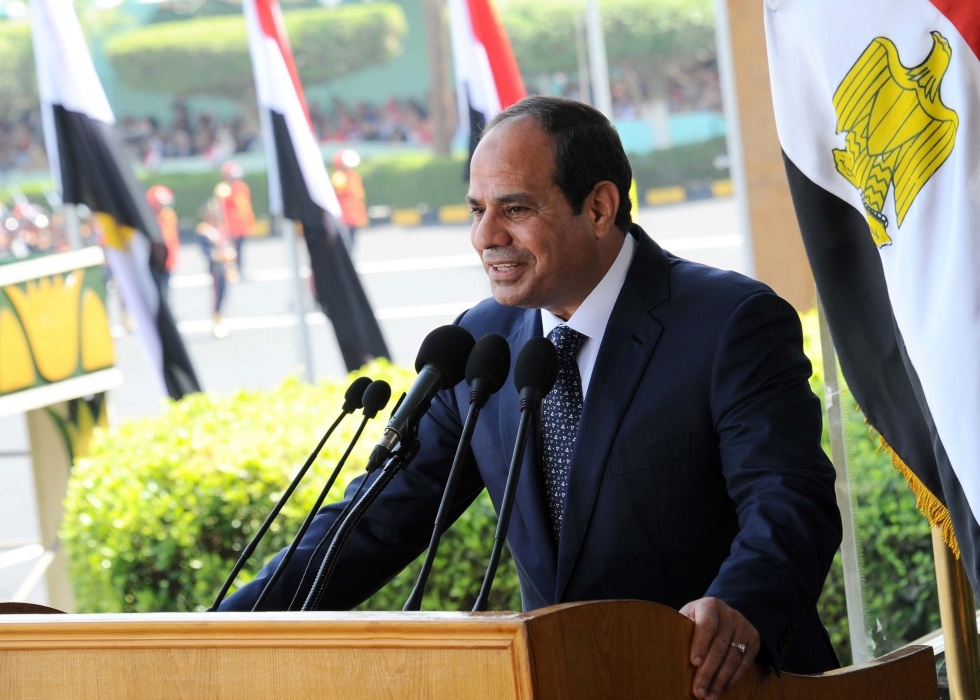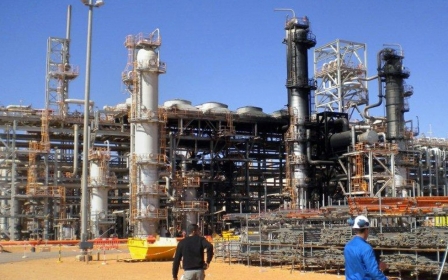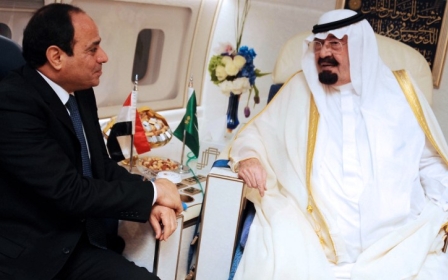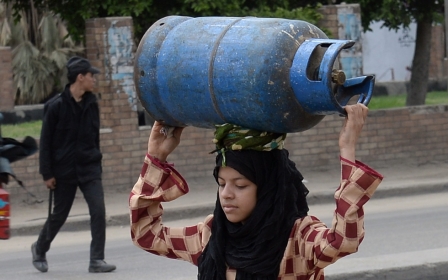Egypt's Sisi chooses Algeria for first state visit

Newly-elected Egyptian president Abdel Fattah Al-Sisi made his first state visit on Wednesday, meeting with Algerian President Bouteflika, as well as Prime Minister Abdel Malek Sellal, and other top officials.
The visit was a brief one, with Sisi leaving on the same day to attend an African Union summit in Malabo, the capital of Equatorial Guinea.
Upon arrival in Algeria, Sisi announced that the aim of the visit was to "benefit from Algerian efforts to combat terrorism."
Security concerns
Michael Hanna, a senior fellow at New York think-tank The Century Foundation, expressed his surprise at Sisi’s choice of his North African neighbour as host for his first state visit as President.
“I would have imagined he would go to the Gulf first. Egypt’s relationship with Algeria is not as strong as its link with some other states.”
He explained that President Sisi has concentrated on cultivating strong relations with the Gulf States.
The new president has already received an official visit from King Abdullah of Saudi Arabia, making his trip to Algeria on Wednesday his first trip abroad since his swearing-in on 8 June.
King Abdullah was the first foreign leader from the region to visit President Sisi, flying to Egypt on 20 June on his way home from Morocco.
Michael Hanna told MEE that the decision to visit Algeria demonstrates serious concern at the security situation in the region.
“If we can draw an inference from the visit, it is the extent to which Egypt views Libya as a security challenge. It also shows that Egypt and Algeria are very seriously concerned, not just about Libya but also about Tunisia and groups like al-Qaeda in the Islamic Maghreb (northwest region of Africa). The bulk of the discussion would have been taken up by security co-ordination.”
The possibility of co-ordination was one of the key topics that President Sisi announced he would deal with in his talks with Algerian officials.
After his plane touched down, he told journalists waiting at the airport in Algiers that he would discuss, among other topics, the security situation in Libya, a country which shares borders with both Egypt and Algeria.
"The phenomenon of terrorism demands appropriate co-ordination and efforts to confront it together."
Co-ordination on energy
Sisi also mentioned the start of consultations regarding “co-operation” between Algeria and Egypt on energy.
Algeria’s state-owned gas company, Sonatrach, announced in early May that it is sending six shipments of natural gas to Egypt, which has seen an ongoing energy crisis during the past months, exacerbated by soaring summer temperatures.
Sisi’s visit to Algeria to discuss co-ordination on security and energy comes a day after the Egyptian president announced plans to implement domestic austerity measures.
There were reports on Wednesday that the government has announced a major shake-up of subsidies.
Egypt’s Ministry of Supplies and Internal Trade decided to lift price protection on staple goods like oil, sugar and rice by around 17 percent, according to pan-Arab daily al-Araby al-Jadid.
By close of trading on Wednesday, stock market indicators had continued to decline, after analysts recorded a drop of 1.6 percent in the benchmark EGX30 index on Tuesday.
Algerian opposition
Algeria’s Movement of Society for Peace, an opposition group close to the Muslim Brotherhood in Algeria, issued fierce criticism regarding Algeria’s leadership for receiving President Sisi.
According to a statement, the movement was “amazed” at the decision to meet with Sisi and worried by its significance, in terms of Algeria’s local and regional orientation, “especially given that the African Union headed by Algeria has condemned the coup” which it said had brought the Egyptian president to power.
The head of the opposition party. Free Islamic Renaissance, Abdel Fattah Hamdash, decried suggestions of further energy co-ordination by Egypt and Algeria.
He wrote on his official Facebook page in the run-up to the visit that “Algeria sells half-price gas to Egypt, and Sisi sells it to Israel at half the price he bought it for from Egypt. How much does Israel profit from the purchase? And how much do the Algerian and Egyptian people lose from the sale?”
His comments appear to reference an article published by Algerian news site Al-Chorouk on Tuesday, which alleges that Egypt’s Ministry of Energy and Petroleum has finalised a deal to buy gas from Algeria at half its usual price.
According to the article, Egypt will buy natural gas at a price of between $4 and $6 per million thermal units, although Algeria usually demands a price of between $10 and $11 per million thermal units on European markets.
Abdel Rahman al-Mabtoul, an economist who spoke to Chorouk, said that “Algeria will be forced to sell liquefied petroleum gas to Egypt at greatly reduced prices.”
He suggested that Algeria’s desire to strengthen relations with the new government of Egypt, which is living through what Chorouk calls an “economic crisis”, could be behind the deal.
Middle East Eye propose une couverture et une analyse indépendantes et incomparables du Moyen-Orient, de l’Afrique du Nord et d’autres régions du monde. Pour en savoir plus sur la reprise de ce contenu et les frais qui s’appliquent, veuillez remplir ce formulaire [en anglais]. Pour en savoir plus sur MEE, cliquez ici [en anglais].




